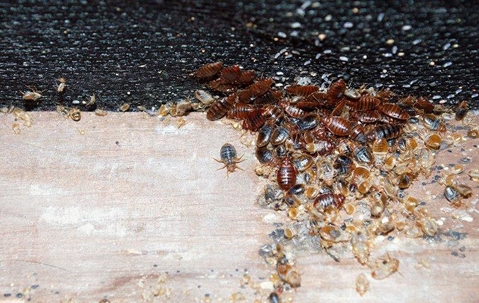Effective Insect Control Steps to Secure Your Yard and Plants
In the realm of horticulture, the consistency of a well-tended yard can usually be interrupted by undesirable pests that threaten the health and wellness and vitality of plants. As garden enthusiasts strive to maintain a thriving exterior area, the difficulty of parasite control becomes an important facet of their horticultural endeavors. Implementing efficient insect control determines not just safeguards the garden's aesthetic appeal yet likewise plays a pivotal role in maintaining the plants' well-being. By exploring a variety of methods that include all-natural repellents, useful insects, friend growing, do it yourself options, and environmentally-friendly chemicals, gardeners can navigate the detailed globe of pest administration with precision and treatment.
All-natural Pest Repellents

Another efficient all-natural insect repellent is diatomaceous planet, a grainy material made from fossilized water organisms. Diatomaceous earth works by literally hurting bugs with its unpleasant structure, making it an outstanding option for controlling insects like slugs, beetles, and caterpillars. Additionally, growing friend plants like marigolds, lavender, or basil can help push back parasites because of their solid fragrances or all-natural chemical compounds.
Beneficial Pest for Parasite Control

An additional beneficial bug is the parasitical wasp, which lays its eggs inside bug bugs, eventually eliminating them. Ground beetles are superb for controlling caterpillars, snails, and slugs. Hoverflies, often mistaken for bees because of their comparable appearance, feed on aphids, thrips, and caterpillars.
To draw in beneficial insects to your garden, you can grow a varied series of flowering plants, such as dill, fennel, and yarrow, which give nectar and pollen for adult bugs. In addition, prevent utilizing broad-spectrum chemicals that can harm both harmful and valuable bugs. By developing a welcoming environment for these helpful insects, you can decrease the need for chemical pesticides and promote a healthier, a lot more well balanced garden ecosystem.
Friend Growing Strategies
When intending to boost the efficiency of useful insects in your yard for all-natural insect control, considering companion find out here planting strategies can even more optimize the community balance. Friend growing involves purposefully positioning particular plants beside each other to optimize their mutual advantages, such as discouraging bugs, attracting useful insects, or enhancing nutrition uptake - bed bug exterminator houston near me. One prominent example is growing marigolds together with tomatoes to repel nematodes and various other harmful insects while also bring in pollinators
In addition, incorporating aromatic natural herbs like basil, mint, or rosemary in between vegetable rows can help discourage bugs with Source their strong aromas. Another effective strategy is growing blossoms such as sunflowers, zinnias, or cosmos to draw in pollinators like and butterflies, which consequently can assist in cross-pollinating your fruit and vegetable plants. Growing trap plants like nasturtiums can divert parasites away from your primary plants, offering as sacrificial plants that secure your beneficial produce. By executing companion planting approaches, you can produce a diverse and harmonious garden ecosystem that normally manages parasites while promoting plant wellness and productivity.
DIY Pest Control Solutions
To efficiently handle parasites in your yard, executing diy pest control remedies can be an affordable and environmentally pleasant method - bed bug exterminator houston near me. Setting up physical obstacles like row covers or netting can also protect against pests like caterpillars from damaging your plants.
One more efficient approach is making use of diatomaceous planet, an all-natural powder that can be sprinkled around plants to prevent slugs, snails, and various other crawling insects. Furthermore, friend planting particular natural herbs and flowers like marigolds, basil, and lavender can assist push back insects and draw in valuable pests. On a regular basis evaluating your plants for indicators of parasite damages and without delay eliminating any affected areas can also prevent invasions from spreading. By incorporating these DIY bug control services right into your gardening routine, you can protect your garden and plants without counting on severe chemicals.
Environmentally-Friendly Pesticides

One more reliable choice is diatomaceous earth, an all-natural substance made from fossilized water microorganisms, which can be sprinkled around plants to regulate slugs, snails, and other crawling pests. In addition, insecticidal soaps and oils stemmed from plant-based sources are beneficial for controlling soft-bodied parasites like aphids, you could check here termites, and whiteflies.
Verdict
In final thought, effective bug control actions such as natural repellents, helpful bugs, buddy planting strategies, DIY services, and environmentally-friendly chemicals are essential for safeguarding your garden and plants. By carrying out these approaches, you can stop damage triggered by pests and keep a healthy and flourishing yard environment. It is very important to think about the long-term influence of utilizing chemicals and select even more sustainable and green options to ensure the health and wellness and well-being of your plants and the environment.